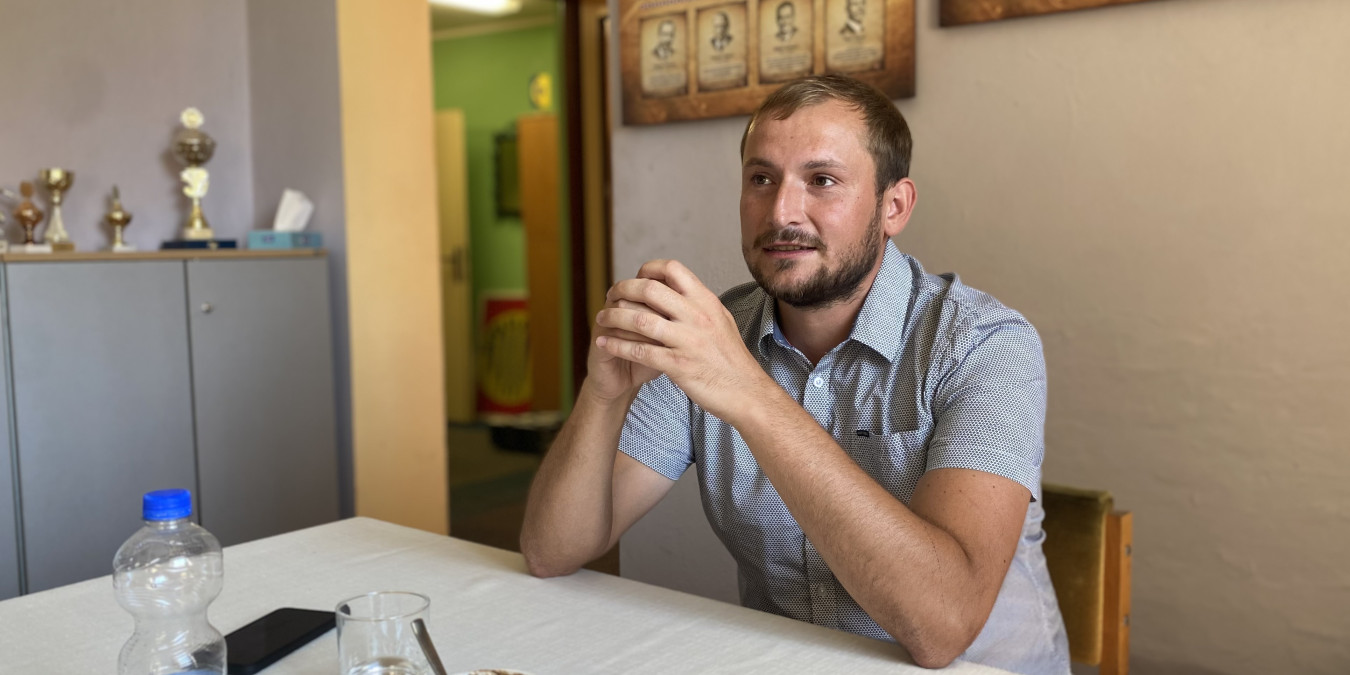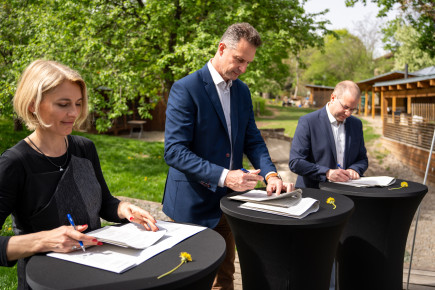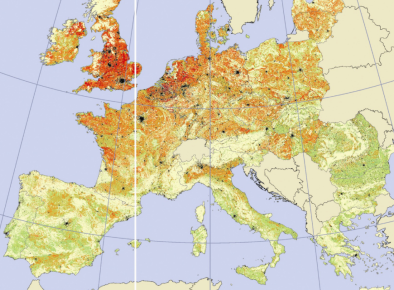Mayor Jelinek: Planting trees will strengthen the Němčice community. I look forward to the new walking paths
Published: Aug 31, 2023 Reading time: 9 minutes Share: Share an articleNěmčice is one of three pilot sites for our LIFE WILL - Water in Landscape and Soil project. And not by chance—the flat, intensively cultivated Polabí region is drying out very quickly. Lukáš Jelínek loves his village, has never left it and never will. He intends to fight the drought, just like the close-knit community of Němčice, which could set an example with its sense of community cooperation.

Lukáš Jelínek has lived in Němčice since he was three years old and is now in his second term as mayor. He had no opponent in the elections, as only one political group has been running in Němčice for years - the Association of Independent Candidates. A plumber by trade and following several technical professions, Lukáš decided that it was time to be close to his family and took up the mayoralty. Gradually, he learned things about his village that he previously had no idea about.
Why did you get involved in the LIFE WILL project?
I had no idea that someone was going around and monitoring the landscape. Dan Pánek, a friend of the vice-mayor, and I went for a walk together one day. I was astonished at how well he had it mapped out and plotted. You think that no stream or river is flowing here in the lowlands, and suddenly, someone else shows you that something is flowing here, something is flowing there. At that moment, you realise how much water flows out of here. And you can't even see it. That first walk was probably the most fascinating for me.
What happened next?
We started talking about the project at the council and agreed that we wanted to be part of it. We had Dan do a feasibility study, which was probably the project's most important step. We expected that within a few years we would apply for some subsidies, but then People in Need got involved in our project, and it grew to its current dimensions within the LIFE WILL project.
As a long-time resident of Němčice who played in the area as a child and is now rediscovering it with new eyes, what do you remember?
I remember how it used to be overgrown everywhere; there were various small ponds. Farming has disturbed everything, and now it's going to come back. The copses weren't there for nothing; they had a function. Even the dirt roads, I dealt with those in my first term. I found out that many of them are on the land registry, but they don't exist. We have an employee in the municipality who used to cover ravine paths with earth himself because these paths prevented the ploughing of fields. In the end, we didn't get the paths done in the first term, and I am glad that the LW project has revived talk of them, and residents will have new walking routes. So it's not just good for the countryside, it's good for people.
How do you actually remember your childhood in Němčice?
We all used to go out, it was lovely. I only remember it positively, especially when I meet someone who has moved away. We usually have a memory of every part of the countryside.
At no stage in your life have you moved away from here?
No, I've lived here since I was three, and it's never even crossed my mind. I'm happy here. Many of us went to live in Kolín for a while, for example, but I guess it's just that group from our youth that draws us back to the village. About 80 % of the guys and girls I grew up with returned to the village.
How has Němčice changed since you were growing up?
It's grown a bit with new construction; we have a new multipurpose Vigvam complex, and some things have been upgraded: new streets, sidewalks, sewers, and water and gas lines. But some still care about the village, so they keep it going. I love it here, and I dare say I know 99 % of the people here. And we don't have any disputes, which is probably the most important thing for the village.
I don't feel there's any fierce political struggle...
Not at all! The important thing is the council. We don't outvote anybody. Someone proposes something and either throws something in, and we discuss it together, or we accept it or reject it unanimously. If we were outvoting each other and making politics here, I wouldn't want to do that; it wouldn't be for me.
The process of discussion that gets to a consensus is exceptional in politics. But I guess it can only work that way in small villages.
I know of a village even smaller than ours where three groups can't even agree on whether to mow this or that piece of lawn. So I'm happy people are relaxed and cooperative here and can work together.
What do you think it is that makes the community so strong in Němčice?
It's not like when you make a satellite town in a village where they have their own community that doesn't get involved in the life of the village. That isn't good. Němčice grew slowly, forcing even the newcomers to get involved in the village. They didn't have ten more newly built houses around them; they needed to get to know each other.
And you actively oppose the satellite?
There's a gentleman here right now who has a proposal to build 50 houses. Fortunately, there's a dedicated road through four plots of land with four owners, three of them old-neighbors. One local has, say, 10,000 metres there, but he said that the most his son or the next generation of his family would build there.
Are you discouraged by the experience of other villages?
At the annual gatherings, I learned that in Němčice near Pardubice, which used to be a smaller village than ours (about 150 inhabitants), a satellite has grown up, and within ten years, they got to about a thousand inhabitants. And the locals don't know the new people. It's like being in a block of flats —people come home, close the door, don't go out and leave again in the morning. That's why we're fighting as hard as we can. And we don't even have the infrastructure for such expansion. In addition, we would have to finance the expansion of the sewage treatment plant.
Did you have to convince any local people that you, as a municipality, would be involved in the project?
I think we have a huge advantage here in that most of the land we plan to improve is municipal. So we've got that out of the way. But for example, the Němeček family owns part of the land near the sewage treatment plant where the ponds are to be built, and they were against it at first. They didn't know what it would do, and they still don't, so a geodetic survey must be done there. I'm glad that over time the Němeček family got involved; they attended lectures and came on excursions to the countryside. Otherwise, we haven't met anyone who outright said they didn't want it. At the workshop, someone said they wanted one thing, and someone said they wanted another, but I think we finally got the three sites selected.
And you're looking forward to the implementation?
I'm looking forward to every project—how it will look and how people will get involved. I'm curious to see how it will work in the end, if people will use the new walking path and how it will help the landscape afterwards. And I'll be most interested in the water retention in the pools and the creek drainage behind the municipal office. But we're still at the beginning.
I guess being involved in the LW project as mayor of the village implies a closer relationship with the environment...
Growing up in a village and spending your free time in its surroundings, you get to know nature and develop a relationship with it. We used to chase pheasants when we were little boys. I go mushroom picking and walk my dog, and I'm a game warden, so I have the area well mapped out.
You said the woods have diminished since you were a kid. I assumed the most extensive destruction was during socialism, but from what you say, it might be different.
I think it started under socialism, and after the revolution inertia kept it going and only now is the landscape returning to its previous form.It wasn't even maintained that much before, so there were a lot more draws and wetlands. Moreover, nowadays, a tracked vehicle can drive through a wetland and plough it up, whereas before, a tractor couldn't because it would get stuck.
What is the feedback on the workshop?
There were probably over thirty people, which I think is excellent. The response was good. And I'm glad that people will be positively affected by this because they have property rights to some of the sites involved. They didn't want to get deeply involved, but they needed to hear it and see if the project had a head and a tail.
What's next?
We'll do the first planting phase in the fall on our own, so I'm curious to see how many people will come and get involved. I'm sure there will be at least twenty of us— these are people who come to the brigade regularly. I always organise one in the spring and one in the autumn. It saves the municipality a lot of money, and then people go for a beer and a chat.
So even planting trees can bring the group together.
That's right. It works here because those who come to the brigade or even the pub get their new neighbours involved. Of course, they used to go out for a pint more often, but that's on the wane; people prefer to be at home. But at least they come to the brigade, they get to know other neighbours from the surrounding streets, and they can visit each other. That's what's important to me—that everybody knows each other, that they're close, and nobody's fighting.


